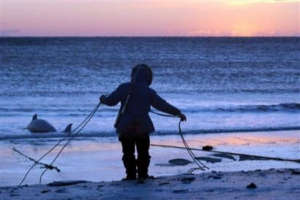December 5, 2005
Polar Ice change
Recently, at the Montreal conference on Climate Change, people have been pissing and moaning about how the polar ice is retreating and this has to be due to anthropogenic global warming. Yahoo/AP has a bunch of photos including this one:Now, let's look at the historical record. From The Scotsman:
Inupiat hunter Karlin Itchoak coils the rope of a subsistence net after pulling in a beluga whale at Cape Nome near Nome, Alaska, as the sun sets Nov. 8, 2005. Warmer temperatures in the Arctic are raising concerns about the social and economic well-being of the people in those regions, said an official with the Inuit Circumpolar Conference. Climate change is already having devastating effects on subsistence gathering in Alaska, Canada and Russia, ICC's Ronald Brower Sr. told participants Nov. 17, 2005, in the Alaska Resource Development Council's annual conference held in Anchorage. (AP Photo/Laurent Dick, File)
Polar history shows melting ice-cap may be a natural cycleI had written about this twice before -- here and here. Posted by DaveH at December 5, 2005 3:00 PM
The melting of sea ice at the North Pole may be the result of a centuries-old natural cycle and not an indicator of man-made global warming, Scottish scientists have found.
After researching the log-books of Arctic explorers spanning the past 300 years, scientists believe that the outer edge of sea ice may expand and contract over regular periods of 60 to 80 years. This change corresponds roughly with known cyclical changes in atmospheric temperature.
The finding opens the possibility that the recent worrying changes in Arctic sea ice are simply the result of standard cyclical movements, and not a harbinger of major climate change.
The amount of sea ice is currently near its lowest point in the cycle and should begin to increase within about five years.
As a result, Dr Chad Dick, a Scottish scientist working at the Norwegian Polar Institute in Tromso, believes the next five to ten years will be a critical period in our understanding of sea ice and the impact, if any, of long-term global warming.
Concern has been expressed recently that animals such as polar bears could become extinct because sea ice is disappearing. The new research by Dr Dick and a colleague, Dr Dimitry Divine, gives rise to hopes the melting will stop soon.
However, Dr Dick warned that if the ice carried on melting, it would mean that man-made global warming had disrupted the natural process - with potentially disastrous results.
He said: "Cycles of 60 to 80 years have been identified before in atmospheric temperature records in the Arctic. The old records that we recovered from ships’ logs and other sources may show that similar cycles are present in sea ice.
"I’ve this gut feeling that within ten years from now we’ll know for certain whether we’re losing sea ice long term or whether it’s coming back.
"If it doesn’t come back it shows we are in serious trouble. Sea ice has a whole lot of effects on climate and it is pretty important."
Sea ice protects the northern coastlines of Canada, Russia and the United States from erosion caused by storms. If it melted, waves crashing on to the shoreline could release vast stores of carbon dioxide stored in permafrost, which would increase global warming still further.
Dr Dick said the research did not suggest that global warming was not a reality.
"You couldn’t say, ‘The sea ice is coming back so therefore there’s no global warming’. It’s never going to be that simple," he said. "But the question now is the extent of global warming, how fast it will happen and whether there are any surprises on the way.
"We know there is warming and that it’s caused by humans, but it will be a great relief to many people if the ice comes back as opposed to going away."
Comments
Post a comment
